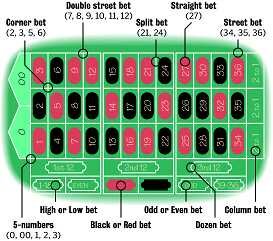Object of the game:
To predict where a small metal ball will land after a spinning wheel comes to a stop.
Table setup:
A multicolored design is printed on green felt to designate the betting possibilities.
The wheel:
A Roulette wheel has 36 number slots and the symbols for 0 and 00. Half the number slots are red and half are black. The 0 & 00 slots are green. Slots are arranged to distribute the even, odd, high and low numbers, the red, black and two green spaces evenly around the wheel. The center of the wheel has a tall spindle. The wheel has a track or raised edge to keep the ball from falling off during play. The Roulette ball is 1/2- to 3/4- inch in diameter.
Basic play:
The dealer spins the wheel counterclockwise and flips the ball into the track in a clockwise direction. When the ball slows down, it bounces randomly until it falls between two metal partitions marking the winning number.
House advantage:
Casinos have a big advantage at this game, taking as much as 5.26% of all the bets placed on individual numbers on the table. Odds are that a player wagering $5 per game on individual numbers will lose $32 over four hours. You'll play 25 to 35 games per hour.

Playing roulette
When seated, you can write down the previous numbers that have come up, but generally the house will not supply paper and pencil.
You cannot place your bet after the ball has started its descent toward the numbered pocket.
Cash all your roulette chips after play. The chips are special to the roulette table, and can't be used in any other games.
Go with trends. If red comes up a lot, go red. There's no guarantee, but gamblers believe in trends.
Betting
Check the minimum bet. A $5 minimum means you must bet at least $5 on the outside of the table (groups such as red or black, even or odd) or $5 spread on any numbers inside.
Sample bets and payoffs